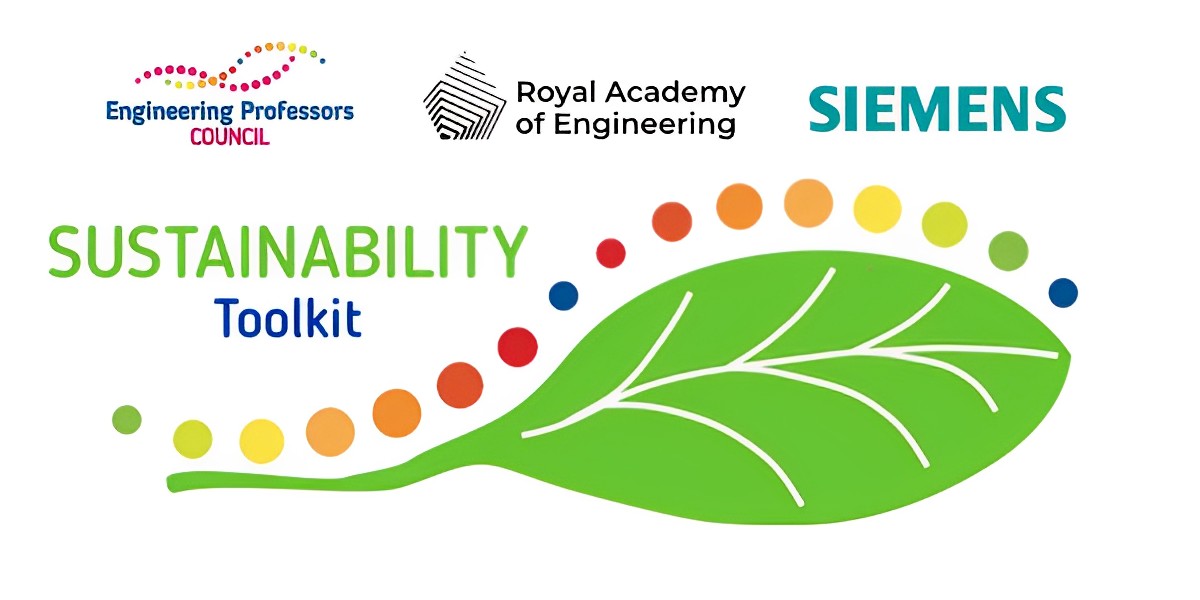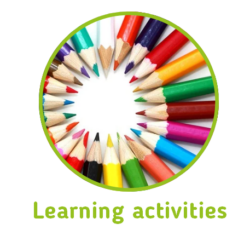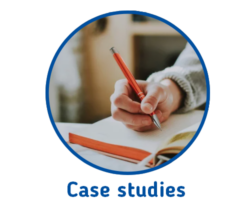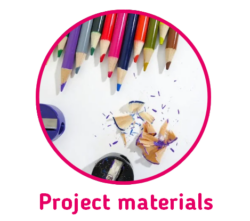Teaching tools help you integrate sustainability into your lessons and are designed so you can implement them within your engineering teaching immediately. They are divided into categories: Activities, Case studies, Project materials, and Assessment and Accreditation materials.
These teaching tools cover a variety of engineering disciplines, professional situations, and issues related to sustainability. They were developed for use in higher education, but they may also be of use in other settings. To help target your specific needs, they have been mapped to Engineers Without Borders UK’s Reimagined Degree map intervention types, UNESCO’s sustainability competencies and the UN SDGs. They are written in parts so that educators have the flexibility to use them as is best suited to their teaching content and environment,
and they permit and encourage the integration of technical content. Along with learning and teaching notes, they contain suggested questions and activities as well as supplementary materials. They are aligned to the expectations of the 4th Edition of the Engineering Council’s Accreditation of Higher Education Programmes and are therefore appropriate for UK teaching and learning contexts. They are, however, easily adapted for use in other countries.
Jump to Assessment and Accreditation materials
Learning activities
| Learning activity | Topic | Keywords | Disciplines | Sustainability competencies | UN SDGs | Reimagined Degree Map Intervention* |
|---|---|---|---|---|---|---|
| Activity: Providing affordable housing that supports net zero |
Calculating effects of implementing energy-saving standards | Built environment Housing Energy efficiency Decarbonisation AHEP Sustainability Higher education Pedagogy |
Energy
Civil engineering Construction Mechanical engineering |
Systems thinking
Critical thinking Integrated problem-solving |
SDG 11 (Sustainable Cities and Communities)
SDG 12 (Responsible Consumption and Production) SDG 13 (Climate Action). |
Active pedagogies and mindsets
More real-world complexity. |
| Activity: Rolling out e-scooters |
Sustainability implications in mobility and technology development | Design Accessibility Technology Policy Electric Vehicles Mobility Circularity AHEP Sustainability Higher education |
Electrical
Robotics Civil Mechanical Computing |
Normative
Self-awareness Strategic Critical thinking |
SDG 4 (Quality education)
SDG 9 (Industry, innovation, and infrastructure) SDG 12 (Responsible consumption and production) SDG 13 (Climate action). |
Active pedagogies and mindset development |
| Activity: Do passive houses need passive people? Adapting to low carbon housing |
Investigating the decarbonisation transition | Decarbonisation Housing Built environment Net zero Carbon emissions Energy efficiency Sustainable energy Local community Curriculum Higher education Sustainability Assessment |
Civil
Structural Chemical Mechanical Electrical Computing |
Systems thinking
Anticipatory Collaboration Self-awareness Normative |
SDG 4 (Quality education)
SDG 7 (Affordable and clean energy) SDG 9 (Industry, Innovation and Infrastructure) SDG 11 (Sustainable cities and communities) |
More real-world complexity
Active pedagogies and mindsets Authentic assessment |
| Activity: Sustainability autobiography |
Building sustainability awareness | Everyday ethics Communication Teaching or embedding sustainability Knowledge exchange SDGs Risk analysis Interdisciplinary Social responsibility AHEP Sustainability Higher education |
Any | Systems thinking
Critical thinking Self-awareness Normative |
Many SDGs could relate to this activity, depending on what students focus on. | Active pedagogies and mindset development |
| How to support students to develop skills that promote sustainability | Transversal skills that promote sustainability | Communication Role-play Teaching or embedding sustainability Sustainability Higher education Systems thinking Critical thinking Teaching and learning Debate |
Any | Systems thinking Critical thinking |
*The Reimagined Degree Map is a guide to help engineering departments navigate the decisions that are urgently required to ensure degrees prepare students for 21st century challenges.
Case studies
| Case study | Topic | Keywords | Disciplines | Sustainability competencies | UN SDGs | Reimagined Degree Map Intervention* |
|---|---|---|---|---|---|---|
| Case study: Beyond the grid – sustainable powering of remote villages | Electrification of remote villages | Sustainability Social responsibility Equality Rural development Environmental conservation AHEP Renewable energy Electrification Higher education Interdisciplinary Pedagogy |
Energy
Electrical Mechanical Environmental |
Anticipatory
Strategic Integrated problem-solving |
SDG7 (Affordable and Clean Energy)
SDG 10 (Reduced Inequalities) SDG 11 (Sustainable Cities and Communities) |
More real-world complexity
Active pedagogies and mindset development Cross-disciplinarity |
| Case study: From plastic waste to infrastructure: understanding circular business models in context | Circular business models | Circular business models Teaching or embedding sustainability Plastic waste Plastic pollution Recycling or recycled materials Responsible consumption Teamwork Interdisciplinary AHEP Higher education |
Chemical
Biochemical Manufacturing |
Integrated problem-solving
Collaboration Systems thinking |
SDG 4 (Quality education)
SDG 11 (Sustainable cities and communities) SDG 12 (Responsible consumption and production) SDG 13 (Climate action) SDG 14 (Life below water) |
More real-world complexity
Active pedagogies and mindset development Authentic assessment Cross-disciplinarity |
| Case study: Navigating tradeoffs for embodied carbon in construction |
Embodied carbon in the built environment | Embodied carbon Resilient construction practices Climate change adaptation Ethics Teaching or embedding sustainability AHEP Higher education Pedagogy Environmental impact assessment Environmental risk Assessment |
Civil engineering
Environmental engineering Construction management |
Integrated problem-solving
Systems thinking Critical thinking Collaboration Anticipatory |
SDG 4 (Quality education)
SDG 9 (Industry, innovation and infrastructure) SDG 11 (Sustainable cities and communities) SDG 13 (Climate action) |
More real-world complexity
Active pedagogies and mindset development Authentic assessment Cross-disciplinarity |
| Case study: Assessing the feasibility of hydrogen fuel for net zero aviation | Achieving carbon-neutral aviation by 2050 | Design and innovation Conflicts of interest Ethics Regulatory compliance Stakeholder engagement Environmental impact AHEP Sustainability Higher education Pedagogy Assessment |
Chemical
Aerospace Mechanical Environmental Energy |
Systems thinking
Anticipatory Critical thinking Integrated problem-solving Strategic Collaboration |
SDG 7 (Affordable and Clean Energy)
SDG 9 (Industry, Innovation and Infrastructure) SDG 12 (Responsible Consumption and Production) SDG 13 (Climate Action) |
More real-world complexity
Active pedagogies and mindset development Authentic assessment |
| Case study: The upward spiral – contrasting Stockholm and Lagos in an analysis of waste management challenges and solutions | Waste management | Sustainability Environmental justice Water and sanitation Community engagement Urban planning Waste management Nigeria Sweden AHEP Higher education |
Environmental
Civil Systems engineering |
Systems thinking
Integrated problem-solving competency Strategic competency |
SDG 6 (Clean Water and Sanitation)
SDG 11 (Sustainable Cities and Communities) SDG 13 (Climate Action) |
More real-world complexity
Active pedagogies and mindset development Cross-disciplinarity |
*The Reimagined Degree Map is a guide to help engineering departments navigate the decisions that are urgently required to ensure degrees prepare students for 21st century challenges.
Project materials
| Project material | Topic | Keywords | Disciplines | Sustainability competencies | UN SDGs | Reimagined Degree Map Intervention* |
|---|---|---|---|---|---|---|
| Flood warning system project brief | Designing a flood warning system to communicate risk | Climate change Water and sanitation Renewable energy Battery Technologies Recycling or recycled materials AHEP Sustainability Student support Local community Environment Future generations Risk Higher education Assessment Project brief |
Electronic
Energy Mechanical |
Systems thinking
Anticipatory Strategic Integrated problem-solving Normative |
SDG 7 (Affordable and Clean Energy)
SDG 11 (Sustainable Cities and Communities) |
More real-world complexity
Active pedagogies and mindset development Authentic assessment |
| Example project: Peace Engineering Dashboard on water, air quality, health, and finance | Communicating river system sustainability | Water and sanitation Infrastructure Community sustainability Health Government policy Social responsibility AHEP Higher education Sustainability Project brief Water quality control |
Civil
Mechanical |
Systems thinking
Anticipatory Collaboration Integrated problem-solving Strategic |
SDG 3 (Good health and well-being)
SDG 4 (Quality education) SDG 6 (Clean water and sanitation) SDG 8 (Decent work and economic growth) |
Active pedagogies and mindsets
More real-world complexity |
| Example coursework: Developing intercultural competence in engineering students |
Links between education for sustainable development (ESD) and intercultural competence | AHEP Sustainability Student support Local community Higher education Assessment Pedagogy Education for sustainable development Internationalisation Global reach Global responsibility EDI |
Civil
Any |
Self-awareness
Collaboration Critical thinking |
SDG 4 (Quality education)
SDG 16 (Peace, justice, and strong institutions) |
More real-world complexity
Active pedagogies and mindset development Authentic assessment |
*The Reimagined Degree Map is a guide to help engineering departments navigate the decisions that are urgently required to ensure
degrees prepare students for 21st century challenges.
Assessment and Accreditation materials
![]()
| Assessment and Accreditation material |
Topic | Keywords | Disciplines | Sustainability competencies | UN SDGs | Reimagined Degree Map Intervention* |
|---|---|---|---|---|---|---|
| Essential sustainability-focused learning outcomes mapped to AHEP4 | Accreditation mapping for sustainability in engineering education | Accreditation and standards Learning outcomes AHEP Student support Sustainability Higher education Students Teaching or embedding sustainability |
Any | Critical thinking
Systems thinking Integrated problem-solving Collaboration |
SDG 12 (Responsible consumption and production) | Adapt and repurpose learning outcomes
More real-world complexity Cross-disciplinarity |
| How to integrate and assess sustainability in the design (capstone) project in Chemical Engineering | ESD in Chemical Engineering projects | Problem-based learning Education for sustainable development Circularity Circular economy Assessment AHEP Sustainability Higher education Design Data Pedagogy |
Chemical | Systems-thinking
Collaboration Integrated problem-solving |
SDG 2 (Zero hunger)
SDG 3 (Good health and well-being) SDG 4 (Quality education) SDG 12 (Responsible consumption and production) SDG 13 (Climate action) |
Active pedagogies and mindset development
Authentic assessment More real-world complexity |
| Integrating sustainable development goals into computing projects | Embedding SDGs into undergraduate computing projects using problem-based learning and teamwork. | Sustainable Development Goals Problem-based learning Teamwork Design thinking Sustainability AHEP Pedagogy Higher education Communication Course design Assessment STEM Curriculum design |
Computing
Computer science Information technology Software engineering |
Collaboration
Integrated problem-solving |
All 17 SDGs | Adapt and repurpose learning outcomes
Active pedagogies and mindset development Authentic assessment. |
| Workflow for embedding the SDGs across engineering programmes and modules | How to integrate the SDGs using a practical framework | Accreditation and standards Assessment Global responsibility Learning outcomes Sustainability AHEP SDGs Curriculum design Course design Higher education Pedagogy |
Any | Anticipatory
Integrated problem-solving Strategic |
SDG 4 (Quality education)
SDG 13 (Climate action) |
Adapt and repurpose learning outcomes
Authentic assessment Active pedagogies and mindset development. |
| Using projects for integrating sustainability into engineering education | Sustainability must-haves in engineering project briefs. | PBL Assessment Project brief Learning outcomes Pedagogy Communication Future generations Decision-making Design Ethics Sustainability AHEP Higher education |
Any | Integrated problem-solving
Collaboration. |
All | Adapt learning outcomes
Active pedagogies and mindsets More real-world complexity Cross-disciplinarity Authentic assessment |
| Evidencing sustainability competencies in assessment | Assessing sustainability competencies in engineering education. | Assessment Design challenges Global responsibility Learning outcomes Sustainability AHEP Higher education Pedagogy |
Any | Integrated problem-solving
Critical thinking. |
SDG 4 (Quality education)
SDG 13 (Climate action) |
Authentic assessment
Active pedagogies and mindset development |
| Integrating Engineering for Sustainable Development (ESD) in Engineering Education | Pedagogical approaches to integrating sustainability | Education for Sustainable Development Teaching or embedding sustainability Course design AHEP Learning outcomes Active learning Assessment Pedagogy Climate change Bloom’s Taxonomy Project-based learning Environment Interdisciplinary Higher education Curriculum |
Any | Integrated problem-solving | SDG 4 (Quality education)
SDG 13 (Climate action) |
Adapt and repurpose learning outcomes
Active pedagogies and mindset development Authentic assessment Cross-disciplinarity |
*The Reimagined Degree Map is a guide to help engineering departments navigate the decisions that are urgently required to ensure
degrees prepare students for 21st century challenges.
Additional information
Check out our other tools that can enhance your knowledge, provide guidance on methods and implementing sustainability concepts, and help you collaborate with others. The EPC’s Sustainability Toolkit is supported by the Royal Academy of Engineering and Siemens. If you want to suggest a resource or contribute a tool that has worked for you, find out how on our Get Involved page
To ensure that everyone can use and adapt these tools in a way that best fits their teaching or purpose, this work is licensed under a Creative Commons Attribution-ShareAlike 4.0 International License. Under this license you are free to share and adapt this material, under terms that you must give appropriate credit and attribution to the original material and indicate if any changes are made.
Any views, thoughts, and opinions expressed herein are solely that of the author(s) and do not necessarily reflect the views, opinions, policies, or position of the Engineering Professors’ Council or the Toolkit sponsors and supporters.



